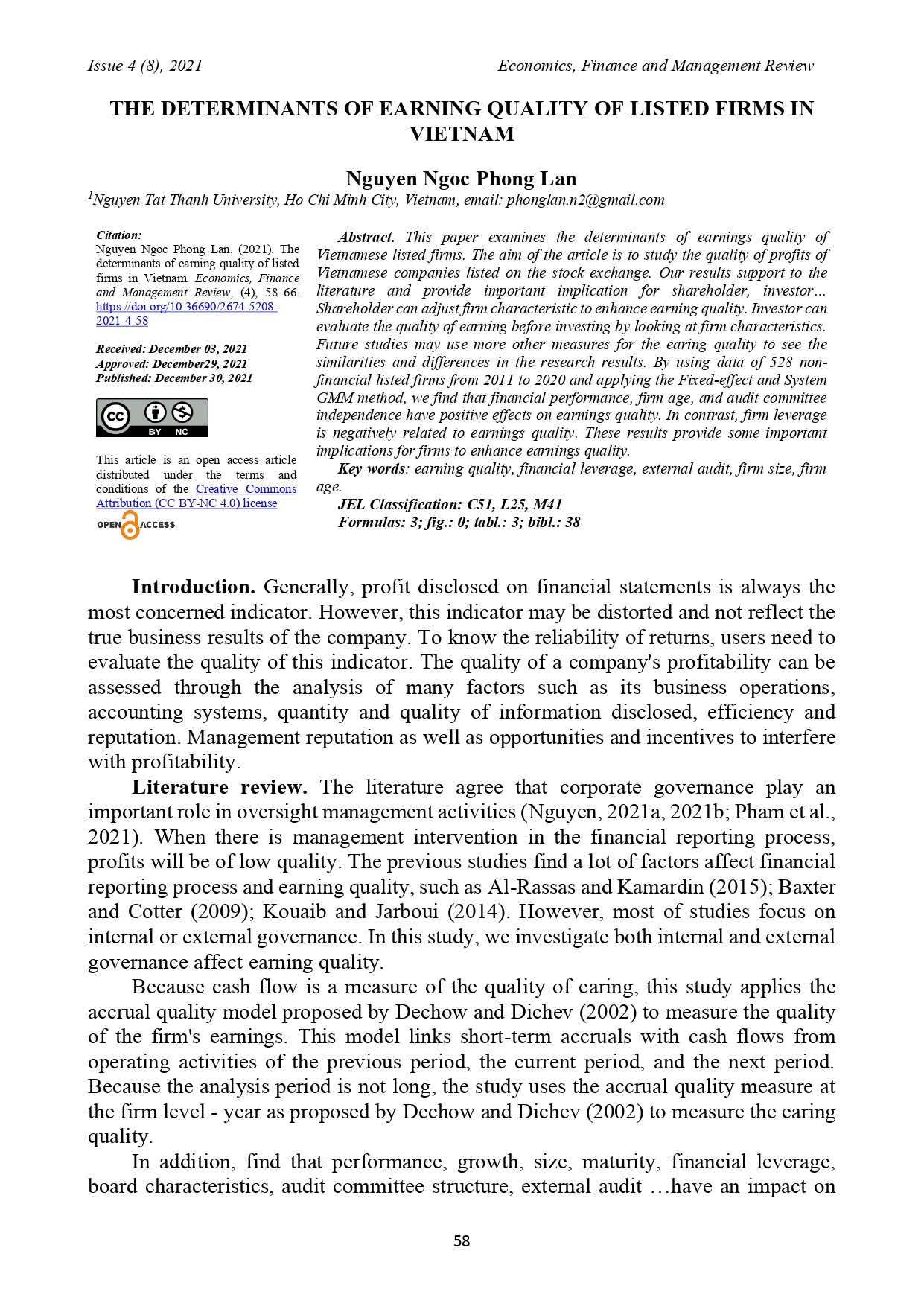THE DETERMINANTS OF EARNING QUALITY OF LISTED FIRMS IN VIETNAM
DOI:
https://doi.org/10.36690/2674-5208-2021-4-58Keywords:
earning quality, financial leverage, external audit, firm size, firm ageAbstract
This paper examines the determinants of earnings quality of Vietnamese listed firms. By using data of 528 non-financial listed firms from 2011 to 2020 and applying the Fixed-effect and System GMM method, we find that financial performance, firm age, and audit committee independence have positive effects on earnings quality. In contrast, firm leverage is negatively related to earnings quality. These results provide some important implications for firms to enhance earnings quality.
Downloads
References
Al-Rassas, A. H., & Kamardin, H. (2015). Internal and external audit attributes, audit committee characteristics, ownership concentration and earnings quality: Evidence from Malaysia. Mediterranean Journal of Social Sciences, 6(3), 458.
Ball, R., & Foster, G. (1982). Corporate financial reporting: A methodological review of empirical research. Journal of accounting Research, 161-234.
Barton, J., & Waymire, G. (2004). Investor protection under unregulated financial reporting. Journal of Accounting and Economics, 38, 65-116.
Baxter, P., & Cotter, J. (2009). Audit committees and earnings quality. Accounting & Finance, 49(2), 267-290.
Dang, V. C., & Nguyen, Q. K. (2021a). Determinants of FDI attractiveness: Evidence from ASEAN-7 countries. Cogent Social Sciences, 7(1), 2004676.
Dang, V. C., & Nguyen, Q. K. (2021b). Internal corporate governance and stock price crash risk: evidence from Vietnam. Journal of Sustainable Finance & Investment, 1-18. doi:10.1080/20430795.2021.2006128
DeAngelo, H., DeAngelo, L., & Skinner, D. J. (1994). Accounting choice in troubled companies. Journal of Accounting and Economics, 17(1-2), 113-143.
Dechow, P. M., & Dichev, I. D. (2002). The quality of accruals and earnings: The role of accrual estimation errors. The accounting review, 77(s-1), 35-59.
Dechow, P. M., Ge, W., Larson, C. R., & Sloan, R. G. (2011). Predicting material accounting misstatements. Contemporary Accounting Research, 28(1), 17-82.
DeFond, M. L., & Jiambalvo, J. (1994). Debt covenant violation and manipulation of accruals. Journal of Accounting and Economics, 17(1-2), 145-176.
Doyle, J. T., Ge, W., & McVay, S. (2007). Accruals quality and internal control over financial reporting. The accounting review, 82(5), 1141-1170.
Eliwa, Y., Haslam, J., & Abraham, S. (2016). The association between earnings quality and the cost of equity capital: Evidence from the UK. International Review of Financial Analysis, 48, 125-139.
Fernández, A. I., & Gonzalez, F. (2005). How accounting and auditing systems can counteract risk-shifting of safety-nets in banking: Some international evidence. Journal of Financial Stability, 1(4), 466-500.
Francis, J., Hanna, J. D., & Vincent, L. (1996). Causes and effects of discretionary asset write-offs. Journal of accounting Research, 34, 117-134.
Francis, J., & Schipper, K. (1999). Have financial statements lost their relevance? Journal of accounting Research, 37(2), 319-352.
Healy, P. M., & Wahlen, J. M. (1999). A review of the earnings management literature and its implications for standard setting. Accounting Horizons, 13(4), 365-383.
Katmon, N., & Al Farooque, O. (2017). Exploring the impact of internal corporate governance on the relation between disclosure quality and earnings management in the UK listed companies. Journal of Business Ethics, 142(2), 345-367.
Kouaib, A., & Jarboui, A. (2014). External audit quality and ownership structure: interaction and impact on earnings management of industrial and commercial Tunisian sectors. Journal of Economics Finance and Administrative Science, 19(37), 78-89.
Lang, M., & Lundholm, R. (1993). Cross-sectional determinants of analyst ratings of corporate disclosures. Journal of accounting Research, 31(2), 246-271.
Lin, J. W., & Hwang, M. I. (2010). Audit quality, corporate governance, and earnings management: A meta‐analysis. International Journal of Auditing, 14(1), 57-77.
Liu, M., Shi, Y., Wilson, C., & Wu, Z. (2017). Does family involvement explain why corporate social responsibility affects earnings management? Journal of Business Research, 75, 8-16.
Nguyen, Q., & Dang, V. (2020). Audit committee structure and bank stability in Vietnam. ACRN Journal of Finance and Risk Perspectives, 8(1), 240-255.
Nguyen, Q. K. (2020). Ownership structure and bank risk-taking in ASEAN countries: A quantile regression approach. Cogent Economics & Finance, 8(1), 1809789.
Nguyen, Q. K. (2021a). Audit Committee Structure, Institutional Quality, and Bank Stability: Evidence from ASEAN Countries. Finance Research Letters, 102369. doi:https://doi.org/10.1016/j.frl.2021.102369
Nguyen, Q. K. (2021b). Oversight of bank risk-taking by audit committees and Sharia committees: conventional vs Islamic banks. Heliyon, 7(8), e07798.
Nguyen, Q. K. (2022). Determinants of bank risk governance structure: A cross-country analysis. Research in International Business and Finance, 60, 101575. doi:https://doi.org/10.1016/j.ribaf.2021.101575
Parte-Esteban, L., & García, C. F. (2014). The influence of firm characteristics on earnings quality. International Journal of Hospitality Management, 42, 50-60.
Pham, Q. T., Ho, X. T., Nguyen, T. P. L., Pham, T. H. Q., & Bui, A. T. (2021). Financial reporting quality in pandemic era: case analysis of Vietnamese enterprises. Journal of Sustainable Finance & Investment, 1-23.
Schipper, K. (1989). Earnings management. Accounting Horizons, 3(4), 91.
Schipper, K., & Vincent, L. (2003). Earnings quality. Accounting Horizons, 17, 97-110.
Skinner, D. J., & Soltes, E. (2011). What do dividends tell us about earnings quality? Review of Accounting Studies, 16(1), 1-28.
Srinidhi, B., Gul, F. A., & Tsui, J. (2011). Female directors and earnings quality. Contemporary Accounting Research, 28(5), 1610-1644.
Sun, J., & Liu, G. (2014). Audit committees’ oversight of bank risk-taking. Journal of Banking & Finance, 40, 376-387.
Ullah, S., Akhtar, P., & Zaefarian, G. (2018). Dealing with endogeneity bias: The generalized method of moments (GMM) for panel data. Industrial Marketing Management, 71, 69-78.
Vasilescu, C., & Millo, Y. (2016). Do industrial and geographic diversifications have different effects on earnings management? Evidence from UK mergers and acquisitions. International Review of Financial Analysis, 46, 33-45.
Watts, R. L., & Zimmerman, J. L. (1990). Positive accounting theory: a ten year perspective. Accounting review, 65(1), 131-156.
Wintoki, M. B., Linck, J. S., & Netter, J. M. (2012). Endogeneity and the dynamics of internal corporate governance. Journal of financial economics, 105(3), 581-606.
Zgarni, I., Hlioui, K., & Zehri, F. (2016). Effective audit committee, audit quality and earnings management. Journal of Accounting in Emerging Economies, 6(2), 138-155.

Downloads
Published
How to Cite
Issue
Section
License

This work is licensed under a Creative Commons Attribution-NonCommercial 4.0 International License.








